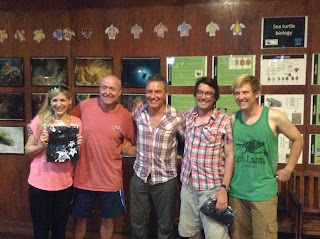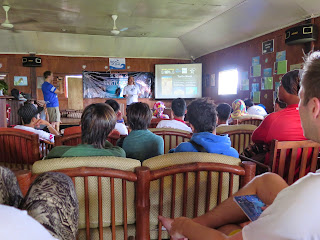 The third day of Turtle Week had our staff our conducting a reef check around Pulau Mabul. Reef checks are a crucial part of reef conservation, providing us with an idea of the health of our coral reefs. Reef checked trained divers lay a 100m transect line. Within this line they gather information on fish, invertebrates and substrates. There are certain indicator species that provide a picture of the health of the reef and we can gain an understanding of whether our reefs are declining or improving. Of course, as divers and snorkellers we are invested in maintaining the health of our coral reefs. Having a better understanding of the state of our reefs can be hugely beneficial to maintaining a balanced ecosystem.
The third day of Turtle Week had our staff our conducting a reef check around Pulau Mabul. Reef checks are a crucial part of reef conservation, providing us with an idea of the health of our coral reefs. Reef checked trained divers lay a 100m transect line. Within this line they gather information on fish, invertebrates and substrates. There are certain indicator species that provide a picture of the health of the reef and we can gain an understanding of whether our reefs are declining or improving. Of course, as divers and snorkellers we are invested in maintaining the health of our coral reefs. Having a better understanding of the state of our reefs can be hugely beneficial to maintaining a balanced ecosystem. The evening brought a fascinating presentation from Scott Mayback who talked about the turtle rehabilitation work he does on Gaya Island just off Kota Kinabalu. It was inspiring to hear about the turtles that he has helped nurse back to health. There are many things that affect the health of sea turtles, with plastic of course being a large concern. A large part of a green turtles diet is jellyfish and sadly turtles will mistake plastic bags for food. As turtles are unable to digest plastic it will start to build up in the system. This, as you can imagine, causes huge problems for turtles, and is one of the many reasons Scuba Junkie places such an emphasis on reef and beach cleans. We at Scuba Junkie paid particularly close attention to the fascinating information provided in Scott's presentation, as his expertise will help us massively with regard to our own Turtle Rehabilitation centre. This centre will have its grand opening later this week, and we will be relying on the experience of people like Scott to ensure its success.
 This week we have also conducted a pub quiz. The night was hugely successful and we raised over 500RM for Turtle Conservation. Our Environmental Officer - Dave - was our quizmaster for the evening and had composed a quiz filled with turtle trivia. Our top prize was a turtle adoption and turtle hatchery t-shirt, second prize was a Dive Against Debris reef clean goody bag and third place earned a goody bag kindly donated by WWF. It was great to see everyone getting involved and coming together to raise money for our beloved turtles. And a huge congratulations to our winning teams!
This week we have also conducted a pub quiz. The night was hugely successful and we raised over 500RM for Turtle Conservation. Our Environmental Officer - Dave - was our quizmaster for the evening and had composed a quiz filled with turtle trivia. Our top prize was a turtle adoption and turtle hatchery t-shirt, second prize was a Dive Against Debris reef clean goody bag and third place earned a goody bag kindly donated by WWF. It was great to see everyone getting involved and coming together to raise money for our beloved turtles. And a huge congratulations to our winning teams!Later on in the week we held workshops with the local Bajau children. One of our local dive-masters, Afat, assisted in translating for the rest of our staff during the activities we had organised for them. He was also hugely helpful in explaining to the local community the importance of turtles in this area. The ability to reach out to the younger generations on Pulau Mabul is something we place a lot of emphasis on. This is an an area in which we see a real opportunity to make some serious changes in attitudes towards recycling and pollution. We were therefore of course incredibly grateful for the children who came along and got stuck in, and hopeful that they will have taken at least a small part of the message home with them.
Also this week, Scuba Junkie saw staff, interns and guests getting involved in another massive beach clean. We collected a huge amount of rubbish from our shore which will be transported from the island later this week. As previously mentioned Scuba Junkie are huge advocates for beach cleans. Although they may not be the most glamorous part of conservation work, their effect is immediate. Every bag you remove during a beach clean is one less bag that a turtle may try to eat. We are hugely appreciative of everyone who came and got stuck in and showed their support.
Last night we had Aaron 'Bertie' Gekoski give a lively presentation on how social media can play a part in spreading the conservation message. Aarron is a journalist and presenter who has worked in some fascinating places. He has been witness to some devastating events and shared some of these with us. From filming the massacre of hundreds of thousands of turtles as part of a religious festival in Bangladesh, to filming starving elephants in Zimbabwe there is no doubt that Aaron has been involved in documenting some horrific things happening world wide. What Aaron explained to us was how far reaching social media truly is, and that we should be using this to spread the message of conservation. The saying that 'a picture is worth a thousand words' seems apt for what he discussed. With the likes of Facebook, Twitter and YouTube becoming more and more influential we are able to inform others of what we are fighting for.























